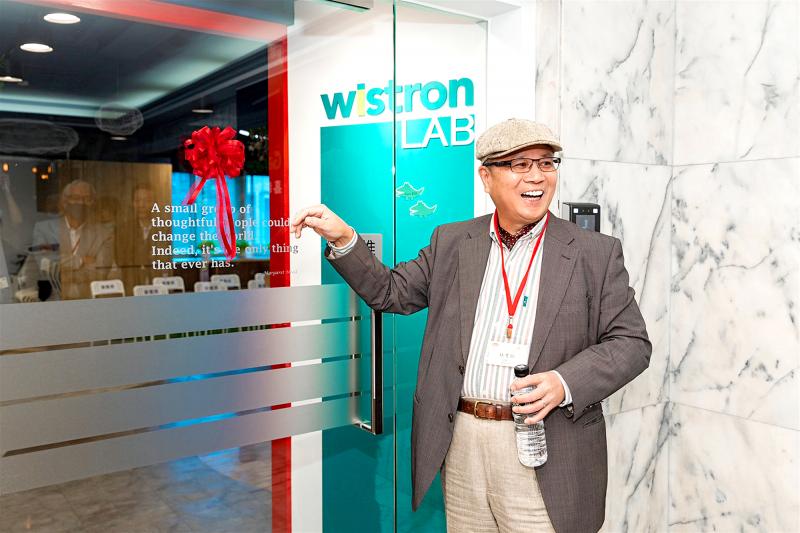Contract electronics manufacturer Wistron Corp (緯創) yesterday confirmed that one of its employees had tested positive for COVID-19.
The employee works at its offices in New Taipei City’s Sijhih District (汐止), but has not been in since Friday last week, Wistron said.
The company said it does not expect its operations to be affected by the employee’s health status, or the nationwide level 3 COVID-19 restrictions.

Photo courtesy of Wistron Corp
“The case in question has not been linked with any other individuals at the company,” Wistron said. “We have introduced staggered shifts and separate zones to try and keep employees safe. Since Tuesday, people who are able to do so have been working from home.”
Employees in the research and development and sales departments who can easily work from home have been doing so since Tuesday, including the person in question, it said.
However, the company did not give a firm figure of how many of its staff are working from home.
“Of course, the production staff cannot work from home,” it said. “However, as most of our production facilities are outside of Taiwan, we do not anticipate any work stoppages.”
There have been other tech companies in Taiwan whose employees have tested positive for COVID-19, including Pegatron (和碩) and Largan Precision Co (大立光).
However, since tech companies mostly have their headquarters and research and development unit in Taiwan, but the bulk of their production facilities offshore, their production is unlikely to be seriously affected by the current outbreak, National Central University (國立中央大學) professor Dachrahn Wu (吳大任) said.
“Tech companies are unlikely to have their production affected by the outbreak because their office staff can work from home and their factory staff are often offshore,” Wu said. “However, look for traditional production to become seriously affected if the COVID-19 clusters spread outside of Taipei and New Taipei City into the industrial stronghold of Taoyuan.”
In general, Wu said he is optimistic about Taiwan recovering from the current outbreak even under level 3 alert, or a soft lockdown.
“We might be able to avoid a hard level 4 lockdown because in general people are compliant when it comes to contact tracing and reducing unnecessary contact,” he said.
However, should Taiwan fail to curb the outbreak and resort to a level 4 hard lockdown, the economic damage would be far higher, he said.
“Even if you are as highly automated as Taiwan Semiconductor Manufacturing Co (台積電), somebody has to come in and run the fabs,” he said. “There would be a big difference in economic impact between level 3 and a level 4 lockdown.”

South Korea’s equity benchmark yesterday crossed a new milestone just a month after surpassing the once-unthinkable 5,000 mark as surging global memory demand powers the country’s biggest chipmakers. The KOSPI advanced as much as 2.6 percent to a record 6,123, with Samsung Electronics Co and SK Hynix Inc each gaining more than 2 percent. With the benchmark now up 45 percent this year, South Korea’s stock market capitalization has also moved past France’s, following last month’s overtaking of Germany’s. Long overlooked by foreign funds, despite being undervalued, South Korean stocks have now emerged as clear winners in the global market. The so-called “artificial intelligence

NEW IDENTITY: Known for its software, India has expanded into hardware, with its semiconductor industry growing from US$38bn in 2023 to US$45bn to US$50bn India on Saturday inaugurated its first semiconductor assembly and test facility, a milestone in the government’s push to reduce dependence on foreign chipmakers and stake a claim in a sector dominated by China. Indian Prime Minister Narendra Modi opened US firm Micron Technology Inc’s semiconductor assembly, test and packaging unit in his home state of Gujarat, hailing the “dawn of a new era” for India’s technology ambitions. “When young Indians look back in the future, they will see this decade as the turning point in our tech future,” Modi told the event, which was broadcast on his YouTube channel. The plant would convert

‘SEISMIC SHIFT’: The researcher forecast there would be about 1.1 billion mobile shipments this year, down from 1.26 billion the prior year and erasing years of gains The global smartphone market is expected to contract 12.9 percent this year due to the unprecedented memorychip shortage, marking “a crisis like no other,” researcher International Data Corp (IDC) said. The new forecast, a dramatic revision down from earlier estimates, gives the latest accounting of the ongoing memory crunch that is affecting every corner of the electronics industry. The demand for advanced memory to power artificial intelligence (AI) tasks has drained global supply until well into next year and jeopardizes the business model of many smartphone makers. IDC forecast about 1.1 billion mobile shipments this year, down from 1.26 billion the prior

People stand in a Pokemon store in Tokyo on Thursday. One of the world highest-grossing franchises is celebrated its 30th anniversary yesterday.